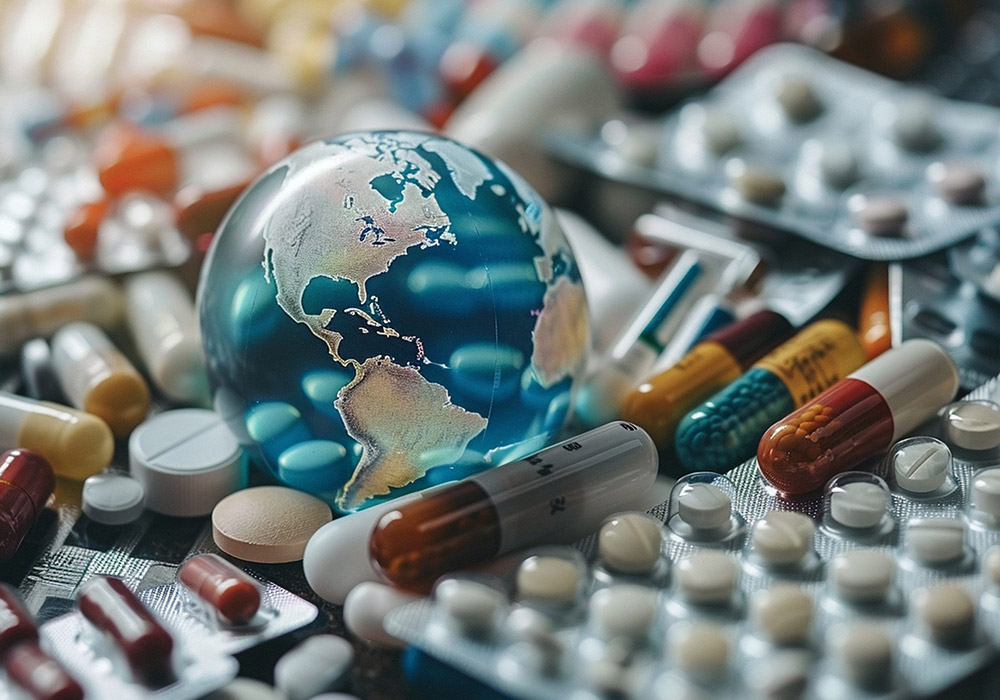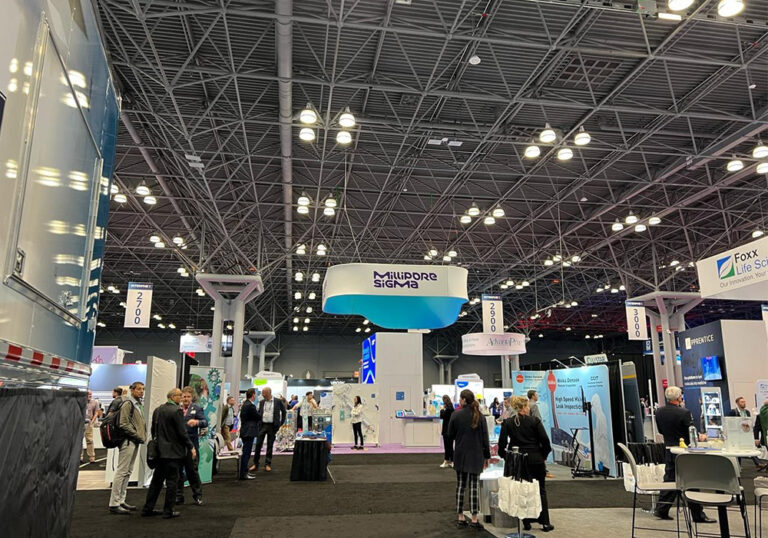Recent
News and Articles
- Seyed Morteza Moosavi
- News & Events
Advancements in Novel Biologic Drug Development
Recent breakthroughs in the development of new biologic drugs offer a promising outlook for treating numerous complex and dangerous diseases. This category of drugs, which includes proteins, antibodies, and other large biological molecules, plays a vital role in managing autoimmune disorders and certain types of cancers. In recent years, pharmaceutical and biotechnology companies have increasingly invested heavily in this field, as the positive outcomes of research and the efficacy of these treatments have attracted significant attention from the medical community and patients alike.
One of the main reasons for focusing on biological drugs is their ability to target specific molecular mechanisms of diseases. Unlike traditional chemical drugs that often work via broad mechanisms, biological drugs are specifically designed to inhibit harmful cells or proteins in the body. This precise targeting can lead to reduced side effects and increased treatment efficacy, resulting in remarkable improvements for chronic patients, especially those suffering from autoimmune diseases such as rheumatoid arthritis and Crohn’s disease.
Moreover, biological drugs continue to lead the field in cancer treatment. Immunotherapy, a key branch of this domain, harnesses the body’s immune system to combat cancer cells. Novel methods such as immune checkpoint inhibitors and CAR-T cell therapies have not only increased the hope for recovery in many patients but have also revolutionized the approach to malignant diseases. In numerous cases, these therapies are offered as options for patients who do not respond to conventional treatments.
Investment in biological technologies has created exceptional opportunities not only for large pharmaceutical companies but also for innovative startups. This innovative environment has encouraged many companies to pursue new drug formulations while simultaneously focusing on sustainable and cost-effective production methods. Additionally, international collaborations among companies, universities, and research institutions have accelerated the discovery and development of new drugs, facilitating knowledge and experience sharing.
Globally, the development of biological drugs is advancing rapidly, especially in developed countries; however, developing nations have also joined this trend. With increasing demand for novel drugs and the availability of appropriate production infrastructure, numerous opportunities have emerged to export these drugs to global markets. Iran, with its innovative companies active in this sector, can increase its share in this growing market and play an important role in improving international health.
Challenges related to the production and distribution of biological drugs remain. One of the most significant challenges is the high cost and complexity of developing and manufacturing these drugs. Establishing fully controlled production environments to ensure product quality and efficacy requires substantial investment and strict international standards. Nevertheless, technological advances and improved manufacturing methods are helping to reduce costs and enhance accessibility to these advanced therapies.
Ultimately, given the potential impact of these drugs on public health, international cooperation and supportive government policies can play a crucial role in accelerating their development. Progress in this area not only aids in treating serious diseases but can also serve as a bridge to improve the efficiency and quality of healthcare services, which will be valuable for the global community.
- Seyed Morteza Moosavi
- News & Events
Cutting-edge research in pharmaceutical science has introduced a new paradigm in healthcare: “personalized treatments. This category of drugs, which includes proteins, antibodies, and other large biological molecules, plays a vital role in managing autoimmune disorders and certain types of cancers. In recent years, pharmaceutical and biotechnology companies have increasingly invested heavily in this field, as the positive outcomes of research and the efficacy of these treatments have attracted significant attention from the medical community and patients alike.
One of the main reasons for focusing on biological drugs is their ability to target specific molecular mechanisms of diseases. Unlike traditional chemical drugs that often work via broad mechanisms, biological drugs are specifically designed to inhibit harmful cells or proteins in the body. This precise targeting can lead to reduced side effects and increased treatment efficacy, resulting in remarkable improvements for chronic patients, especially those suffering from autoimmune diseases such as rheumatoid arthritis and Crohn’s disease.
Moreover, biological drugs continue to lead the field in cancer treatment. Immunotherapy, a key branch of this domain, harnesses the body’s immune system to combat cancer cells. Novel methods such as immune checkpoint inhibitors and CAR-T cell therapies have not only increased the hope for recovery in many patients but have also revolutionized the approach to malignant diseases. In numerous cases, these therapies are offered as options for patients who do not respond to conventional treatments.
Investment in biological technologies has created exceptional opportunities not only for large pharmaceutical companies but also for innovative startups. This innovative environment has encouraged many companies to pursue new drug formulations while simultaneously focusing on sustainable and cost-effective production methods. Additionally, international collaborations among companies, universities, and research institutions have accelerated the discovery and development of new drugs, facilitating knowledge and experience sharing.
Globally, the development of biological drugs is advancing rapidly, especially in developed countries; however, developing nations have also joined this trend. With increasing demand for novel drugs and the availability of appropriate production infrastructure, numerous opportunities have emerged to export these drugs to global markets. Iran, with its innovative companies active in this sector, can increase its share in this growing market and play an important role in improving international health.
Challenges related to the production and distribution of biological drugs remain. One of the most significant challenges is the high cost and complexity of developing and manufacturing these drugs. Establishing fully controlled production environments to ensure product quality and efficacy requires substantial investment and strict international standards. Nevertheless, technological advances and improved manufacturing methods are helping to reduce costs and enhance accessibility to these advanced therapies.
Ultimately, given the potential impact of these drugs on public health, international cooperation and supportive government policies can play a crucial role in accelerating their development. Progress in this area not only aids in treating serious diseases but can also serve as a bridge to improve the efficiency and quality of healthcare services, which will be valuable for the global community.
- Seyed Morteza Moosavi
- News & Events
Heightened global awareness of environmental crises and the impacts of climate change is driving the pharmaceutical industry towards improving sustainability in its supply chains and manufacturing processes.
Pharmaceutical companies are now reassessing their operations to minimize environmental footprints by reducing natural resource consumption and lowering greenhouse gas emissions. This approach not only contributes to environmental protection but also generates economic value and enhances the reputation of brands active in this sector.
One key strategy in this context is the use of sustainable raw materials. Many companies are seeking to replace chemical inputs with renewable and biodegradable alternatives. Such shifts in raw material sourcing can significantly reduce pollutant emissions and optimize the use of natural resources. In particular, companies specializing in the production of herbal and biopharmaceutical products have the opportunity to leverage this trend by utilizing resources that exert less environmental impact.
Another important aspect of this transformation is improving energy efficiency in pharmaceutical manufacturing. Numerous pharmaceutical factories are adopting advanced technologies to manage energy consumption and utilize renewable energy sources such as solar and wind power. These technologies not only reduce production costs but also substantially decrease the companies’ carbon footprints. Some firms are even designing facilities to operate entirely on clean energy, paving the way for greener business models.
Regulatory pressures from governments and oversight bodies also play a critical role in these changes. Many countries have enacted stringent regulations aimed at reducing carbon emissions and enhancing industrial sustainability. Pharmaceutical companies that fail to comply may face penalties and operational restrictions. Consequently, many companies are investing in solutions that not only address these challenges but also position them as sustainability leaders within the industry.
Progress in sustainable pharmaceutical supply chains has also created opportunities for new innovations. Companies that can effectively leverage digital technologies and advanced tools such as blockchain to track and optimize their supply chains gain greater transparency and efficiency. This transparency is valuable not only to consumers but also to regulators and industry partners, fostering greater trust.
Innovative companies like “Blue Seven Skies” and others can capitalize on these shifts to strengthen their positions in global markets. Investing in research and development to enhance sustainability allows these firms to manufacture pharmaceutical products meeting high environmental standards while contributing to global public health. Such strategies may also open doors for expanded international collaborations.
Ultimately, focusing on sustainable supply chains benefits not only the environment but also offers a competitive advantage to pharmaceutical companies. Consumers and patients are increasingly attentive to companies’ environmental practices and make purchasing decisions accordingly. Therefore, pursuing sustainability can support long-term growth and success in the industry while enabling innovative and responsible solutions.
- Seyed Morteza Moosavi
- News & Events
Iran’s pharmaceutical industry has witnessed significant progress in recent years concerning the export of high-quality medicinal products. Leveraging advanced technological capabilities and cutting-edge knowledge, Iranian pharmaceutical companies have successfully elevated their position in international markets, emerging as serious competitors on the global stage. These achievements are not only the result of substantial investments in research and development but also stem from the intelligent application of modern scientific management practices across the entire supply chain.
Leading companies in Iran’s pharmaceutical sector, such as “Blue Seven Skies,” utilize specialized expertise and innovative technologies to manufacture products that meet global standards. By adhering to international regulations and employing high-quality raw materials, these companies produce pharmaceuticals that have gained approval and strong acceptance in foreign markets. A key strategic approach for these firms involves close collaboration with researchers and academic institutions to continuously update production processes and enhance product efficiency.
One of the most significant factors that can drive the growth of Iran’s pharmaceutical exports is the advancement of innovative technologies in product manufacturing and packaging. The adoption of cutting-edge technologies such as nanotechnology and biotechnology has enabled Iranian products to compete at a high level in terms of quality and efficacy. Moreover, the implementation of sustainable production methods has not only reduced costs but also opened doors to markets that prioritize environmental sustainability.
The export opportunities for Iranian pharmaceuticals in global markets are extensive, driven by the rising demand for affordable, high-quality medicines. Countries in the Middle East, Africa, and parts of Europe are actively seeking to import pharmaceuticals that combine optimal quality with competitive pricing. As one of the region’s major pharmaceutical producers, Iran has the potential to increase its market share through the development of distribution networks and international partnerships, thereby playing a pivotal role in global health provision.
The role of government and supportive policies is also crucial in this context. Achieving success in pharmaceutical exports requires establishing the necessary legal and economic infrastructure and strengthening trade agreements with target countries. Additionally, providing incentives and facilities for knowledge-based companies and entrepreneurs in this industry can foster greater innovation and the development of new products. Enhancing the business environment and supporting active companies in this field can lead to significant growth in pharmaceutical exports.
Challenges such as international sanctions and trade barriers may act as impediments. However, many Iranian pharmaceutical companies have managed to overcome these obstacles with flexibility and creative solutions. Collaborations with international organizations and adherence to global standards have helped Iranian firms gain the trust of foreign consumers and access new markets.
Ultimately, innovative progress in the export of Iranian pharmaceuticals not only contributes to improving patients’ quality of life worldwide but also strengthens Iran’s position as a key player in the global healthcare industry. By focusing on research and development, scientific management, and the use of advanced technologies, Iran has the opportunity to become one of the main suppliers of high-quality medicines internationally while simultaneously supporting the country’s economic growth.
- Seyed Morteza Moosavi
- News & Events
Amid growing concerns about climate change and the environmental footprint of various industries, pharmaceutical companies are increasingly expanding their efforts to develop sustainable technologies within their supply chains. The primary goal of these initiatives is to reduce environmental footprints while improving the efficiency of production and distribution processes. This approach is not only vital for environmental protection but also enables companies to optimize resource management and achieve long-term economic savings.
One key strategy adopted by pharmaceutical companies, including “Blue Seven Skies,” is the utilization of sustainable and renewable raw materials. Chemical substances and biological compounds that have lower detrimental environmental effects have become a priority for manufacturers. For instance, plant-based materials and biotechnologies produced through environmentally friendly processes are increasingly employed in sustainable pharmaceutical production. These companies seek to reinforce their environmental commitments by sourcing raw materials from sustainable origins.
Energy management is another crucial factor in this direction. The use of renewable energy sources such as solar and wind power to supply electricity for manufacturing plants significantly contributes to reducing carbon footprints. Some pharmaceutical companies have even designed their facilities to incorporate energy recycling systems, minimizing overall energy consumption. “Blue Seven Skies” is actively working to implement these technologies in its production centers, aiming to reduce reliance on fossil fuels and enhance environmental sustainability.
Moreover, optimizing transportation and distribution processes plays a fundamental role in lowering greenhouse gas emissions. Sustainable pharmaceutical companies employ intelligent solutions such as electric vehicles and route optimization to decrease fuel consumption. The application of digital technologies for supply chain monitoring and management further helps these companies enhance the efficiency of their drug distribution. Such technologies enable precise control over procurement processes and prevent resource wastage.
Sustainability in the pharmaceutical industry extends beyond environmental conservation. Reducing material and energy consumption and streamlining processes can lead to lower production costs and generate new economic opportunities. Companies like “Blue Seven Skies” invest in innovative technologies not only to minimize harmful impacts but also to establish themselves as sustainable and responsible brands in international markets, thereby fostering greater trust and collaboration.
Global environmental commitments and increasingly stringent regulations compel pharmaceutical companies to provide more sustainable solutions. In developed countries, compliance with these standards is often a prerequisite for market entry. Consequently, companies adopting green technologies can more easily access new markets and secure expanded export opportunities.
Ultimately, the development of sustainable technologies in the pharmaceutical supply chain benefits not only the environment but also offers a valuable competitive advantage to pharmaceutical firms. “Blue Seven Skies” and other innovative companies, by focusing on sustainability and employing energy management and sustainable materials technologies, can expand their share in the global healthcare industry while positively impacting local and global communities. A future in which environmental health and human well-being advance hand in hand presents a promising outlook for the pharmaceutical sector.
- Seyed Morteza Moosavi
- News & Events
The past few decades have witnessed international cooperation in health becoming instrumental in bettering public health conditions and broadening access to successful therapies worldwide. Iranian pharmaceutical companies and medical device manufacturers, leveraging advanced scientific capabilities and cutting-edge technologies, have played a significant role in this domain. By focusing on exporting high-quality products and establishing strategic international partnerships, these companies have contributed to enhancing public health indicators across various countries.
A successful example of such collaborations is the export of advanced medical equipment to countries with limited access to medical technologies. Iranian companies have been able to offer diagnostic and therapeutic devices at competitive prices by utilizing specialized knowledge and modern infrastructures. This initiative has not only elevated healthcare standards in recipient countries but also created new economic opportunities for Iran. “Blue Seven Skies” is among the innovative and quality-focused companies actively engaged in this arena.
Iran’s pharmaceutical expertise and innovations, particularly in the production of biopharmaceuticals and herbal medicines, have fostered sustainable relationships with international partners. These advancements have positioned the country as a key player in the global health industry. Iranian pharmaceutical firms, relying on their experience and expertise, have succeeded in producing medications that combine high efficacy with compliance to international standards. Such achievements have garnered the trust of importing countries, resulting in long-term collaborations.
Furthermore, Iran’s efforts in knowledge and technology transfer to other nations constitute another vital aspect of these international collaborations. Through joint projects and manufacturing agreements, Iranian companies have strengthened healthcare infrastructures in various regions around the world. These partnerships have not only improved healthcare services in recipient countries but have also enhanced Iran’s international reputation and standing in the health sector.
The impact of these collaborations on global health indicators has been noteworthy. Access to high-quality medicines and medical equipment has enabled many countries to reduce mortality rates from preventable diseases and improve the quality of life for their populations. Enhancing these indicators has not only promoted public health but also paved the way for expanded inter-country cooperation and strengthened global health security.
Additionally, the establishment of joint research networks with international academic centers has allowed Iranian companies to advance at the forefront of science and technology. Such collaborations facilitate the exchange of knowledge and expertise, significantly bolstering the country’s scientific capabilities. Companies like “Blue Seven Skies” have leveraged these networks to excel in pharmaceutical research and the development of advanced technologies, thereby amplifying their global impact.
In summary, international collaborations for advancing global health have provided a clear and sustainable pathway for Iranian companies. These partnerships have not only contributed to improving the health and welfare of diverse communities but have also supported economic development and growth within Iran’s health industry. Given the rising global healthcare demands and the importance of sustainable health provision, Iran is well-positioned to strengthen its international alliances and emerge as a leading force in the health sector, playing a vital role in enhancing the quality of life worldwide.





All
Categories
Stay Informed with Our Latest Achievements!
Subscribe to our newsletter to ensure you never Miss Key articles and updates. We’ll regularly deliver the newest research, innovations, and pharmaceutical insights directly to you.








